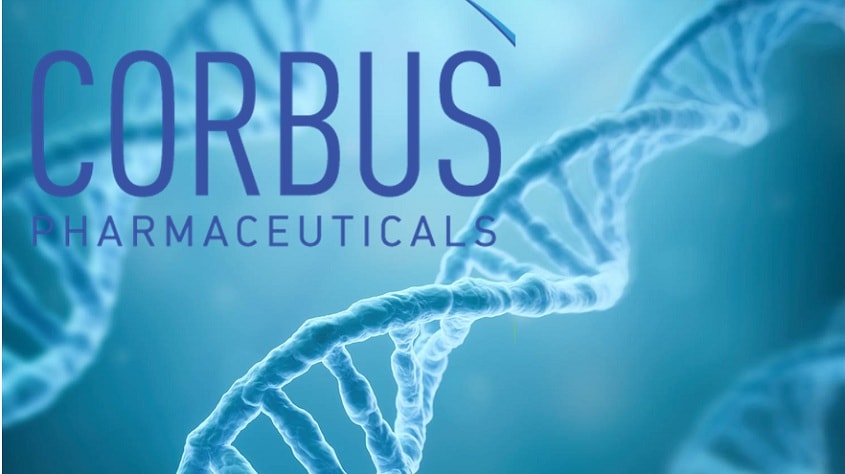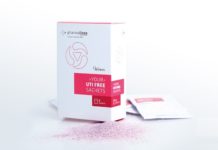Corbus Pharmaceuticals Holdings, Inc. , a clinical stage drug development company targeting rare, serious chronic inflammatory and fibrotic diseases, announced that it has initiated the Company’s Phase 3 study (“RESOLVE-1”) to test the efficacy and safety of anabasum in the treatment of diffuse cutaneous systemic sclerosis (“systemic sclerosis”).
Systemic sclerosis is a serious autoimmune disease affecting approximately 90,000 people in the United States and Europe and is associated with significant morbidity and up to 60% 10-year mortality. There are currently no drugs specifically approved by the U.S. Food and Drug Administration (“FDA”) for treatment of systemic sclerosis.
“Anabasum has the potential to provide meaningful clinical benefit for systemic sclerosis patients without immunosuppression. Even though they are not specifically indicated for systemic sclerosis, currently available immunosuppressive medications are often used to control disease activity in systemic sclerosis with limited efficacy. Further, these drugs can cause side effects including increased risk of infection and require regular monitoring using blood tests. By contrast, anabasum is an oral, selective CB2 agonist with a mechanism of action that targets the resolution of inflammation and fibrosis, key aspects of disease pathogenesis in systemic sclerosis. Efficacy and safety results of the double-blinded, placebo-controlled portion and the open-label extension of the Phase 2 study in systemic sclerosis have been promising, fueling my optimism for this Phase 3 study,” commented Principal Investigator of the RESOLVE-1 Phase 3 study, Robert Spiera, M.D., Director of the Vasculitis and Scleroderma Program at the Hospital for Special Surgery and Professor of Clinical Medicine at Weill Cornell Medical College in New York City.
The international multicenter Phase 3 RESOLVE-1 study is a double-blind, randomized, placebo-controlled study assessing the efficacy and safety of anabasum for the treatment of systemic sclerosis. The study will enroll approximately 354 subjects at 70 sites in North America, Europe, Israel, Japan, South Korea, and Australia. The planned duration of treatment with study drug is 52 weeks. Subjects will be randomized 1:1:1 to receive anabasum 5 mg twice per day, anabasum 20 mg twice per day, or placebo twice per day.
The primary efficacy outcome of the RESOLVE-1 study will be change from baseline in modified Rodnan Skin Score (“mRSS”), a measure of skin fibrosis and a standard clinical trial outcome in systemic sclerosis. Secondary outcomes of the RESOLVE-1 study include patient- and physician-reported outcomes, forced vital capacity, the American College of Rheumatology Combined Response Index in diffuse cutaneous Systemic Sclerosis (“ACR CRISS”) score, a novel composite measure of clinical improvement from baseline that incorporates change from baseline in mRSS, and lung function. These same outcomes were measured in the Phase 2 study as well as the follow-on open-label extension study for which 28 week results in all of these efficacy measures were presented in November 2017 at the American College of Rheumatology conference.
“We are delighted to initiate our Phase 3 RESOLVE-1 study on schedule. The start of this study is an important milestone for Corbus as we continue advancing anabasum for the treatment of rare, serious chronic inflammatory and fibrotic diseases,” commented Yuval Cohen, Ph.D., CEO of Corbus. “We expect to conclude dosing in this Phase 3 study by the end of 2019, potentially positioning Corbus for its first NDA filing by mid-2020.”
Anabasum has been granted Orphan Drug Designation and Fast Track status by the FDA for the treatment of systemic sclerosis and Orphan Drug Designation by the EMA.
About Systemic Sclerosis
Systemic sclerosis is a rare and serious systemic autoimmune rheumatic disease with an unclear etiology. Systemic sclerosis affects approximately 90,000 people in the United States and Europe, with disease onset typically in mid-life. About 80 percent of SSc patients are women. The disease process in systemic sclerosis includes activation of the immune system, with damage to small blood vessels and fibrosis of the skin on internal organs, including lungs, heart, kidneys, gastrointestinal tract and musculoskeletal system. Chronic disease burden, morbidity and mortality are significant. Ten-year mortality rates are high at about 40-60%. Cardiopulmonary disease is the major cause of death in SSc. Immunosuppressive medications such as oral corticosteroids, mycophenolate, methotrexate and cyclophosphamide are used to treat patients with more severe signs and symptoms of disease. Currently, there are no FDA-approved treatments specifically indicated for the treatment of systemic sclerosis, other than pulmonary artery hypertension secondary to connective tissue diseases such as systemic sclerosis.
About Anabasum
Anabasum is a synthetic oral, small molecule selective cannabinoid receptor type 2 (CB2) agonist that preferentially binds to CB2 expressed on activated immune cells and fibroblasts. CB2 activation triggers physiologic pathways that resolve inflammation, speed bacterial clearance and halt fibrosis. CB2 activation also induces the production of specialized pro-resolving lipid mediators that activate an endogenous cascade responsible for the resolution of inflammation and fibrosis, while reducing production of multiple inflammatory mediators. Through activation of CB2, anabasum also is designed to have a direct effect on fibroblasts to halt tissue scarring. Anabasum is believed to induce resolution rather than immunosuppression by triggering biological pathways to turn “off” chronic inflammation and fibrotic processes. Anabasum has demonstrated promising potency in preclinical models of inflammation and fibrosis. Preclinical and human clinical studies have shown anabasum to have a favorable safety, tolerability and pharmacokinetic profile. Further, the drug has demonstrated clinical benefit and positive impact on inflammatory and immunological markers in Phase 2 studies in diffuse cutaneous systemic sclerosis, dermatomyositis and cystic fibrosis.
About Corbus
Corbus Pharmaceuticals Holdings, Inc. is a Phase 3 clinical stage pharmaceutical company focused on the development and commercialization of novel therapeutics to treat rare, chronic, and serious inflammatory and fibrotic diseases. The Company’s lead product candidate, anabasum, is a novel synthetic oral endocannabinoid-mimetic drug designed to resolve chronic inflammation and fibrotic processes. Anabasum is currently being evaluated in a Phase 3 “RESOLVE-1” study in systemic sclerosis and has generated positive data in Phase 2 studies in cystic fibrosis and dermatomyositis. Additionally, the Company is evaluating anabasum in open-label extension studies in systemic sclerosis and skin-predominant dermatomyositis. Corbus expects to commence a Phase 2 study in systemic lupus erythematosus and a Phase 2b study in cystic fibrosis in the fourth quarter of 2017.
Investor Contact
Jenene Thomas
Jenene Thomas Communications, LLC
Phone: +1 (908) 938-1475
Email: jenene@jenenethomascommunications.com
Media Contact
Lindsay G. Deefholts
Lindsay G. Deefholts Scient Public Relations
Phone: +1 (416) 301-7966
Email: ldeefholts@scientpr.com


























